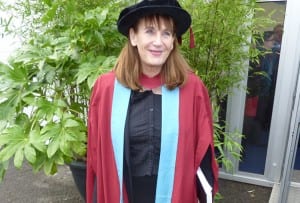 Jo Middlemass, Research Fellow in the CaHRU, was recently been awarded her PhD from the University of Nottingham Sports Centre at University Park campus on Tuesday 10th December, for her study entitled: Behavioural change in the primary prevention of Coronary Heart Disease – Evaluating the Transtheoretical/Stages of Change Behavioural Model: A mixed methods study. The study was supervised by Professor Penny Standen (Professor in Health Psychology and Learning Disabilities) and Professor Nadeem Qureshi (Professor of Primary Care). Jo also expressed gratitude for the encouragement and assistance received from University of Lincoln in particular Professor Niro Siriwardena and Dr. Karen Windle and other members of the CaHRU.
Jo Middlemass, Research Fellow in the CaHRU, was recently been awarded her PhD from the University of Nottingham Sports Centre at University Park campus on Tuesday 10th December, for her study entitled: Behavioural change in the primary prevention of Coronary Heart Disease – Evaluating the Transtheoretical/Stages of Change Behavioural Model: A mixed methods study. The study was supervised by Professor Penny Standen (Professor in Health Psychology and Learning Disabilities) and Professor Nadeem Qureshi (Professor of Primary Care). Jo also expressed gratitude for the encouragement and assistance received from University of Lincoln in particular Professor Niro Siriwardena and Dr. Karen Windle and other members of the CaHRU.
The risk of heart disease is increased by smoking, eating a high fat diet and lack of exercise, all of which are modifiable lifestyle behaviours. The aim of the thesis was to explore the potential for the use of the Transtheoretical/Stages of Change (TTM/SOC) model in primary care and to consider how the findings could help clinicians advise patients to change their unhealthy behaviours. There were three parts to the study; the first part was a structured review which examined studies using the TTM/SOC behavioural model in primary care; the second part reviewed secondary data from a cardiovascular disease study (‘Realising the potential of the family history in risk assessment and primary prevention of coronary heart disease in primary care’ – ADDFAM) which used the TTM/SOC model, to see what change predictors could be found. The third part used semi-structured interviews to identify the facilitators and barriers to behaviour change experienced by individuals attempting to change their unhealthy behaviours, to see if these could be explained in terms of the TTM/SOC model.
 The key findings were: although there was validity in the basic premise that people move through the stages of change there was mixed evidence for the TTM/SOC model either as an intervention, or an outcome/predictor measure; in particular, there was some doubt that movement through the stages of changes equated to actual behavioural change. Moreover, while there was evidence to suggest that TTM/SOC model constructs were used in the process of change, there were some noted differences to the processes outlined in the model. Some additional constructs were identified which may be useful to consider including in the model such as denial/fatalism, psychological aspects and demographic data.
The key findings were: although there was validity in the basic premise that people move through the stages of change there was mixed evidence for the TTM/SOC model either as an intervention, or an outcome/predictor measure; in particular, there was some doubt that movement through the stages of changes equated to actual behavioural change. Moreover, while there was evidence to suggest that TTM/SOC model constructs were used in the process of change, there were some noted differences to the processes outlined in the model. Some additional constructs were identified which may be useful to consider including in the model such as denial/fatalism, psychological aspects and demographic data.
